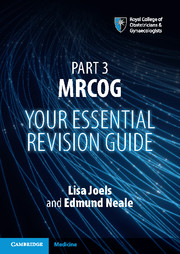Book contents
- Frontmatter
- Contents
- Foreword
- 1 The Part 3 Clinical Assessment in the Context of the MRCOG Examination
- 2 Core Clinical Skills
- 3 The Modules of the Curriculum Assessed in the Part 3 Exam
- 4 Tips for Candidates
- 5 Practice Tasks with Videos
- 6 Revision Resources
- Appendix 1 Part 3 MRCOG Clinical Skills Assessment Template
- Index
Appendix 1 - Part 3 MRCOG Clinical Skills Assessment Template
Published online by Cambridge University Press: 05 September 2016
- Frontmatter
- Contents
- Foreword
- 1 The Part 3 Clinical Assessment in the Context of the MRCOG Examination
- 2 Core Clinical Skills
- 3 The Modules of the Curriculum Assessed in the Part 3 Exam
- 4 Tips for Candidates
- 5 Practice Tasks with Videos
- 6 Revision Resources
- Appendix 1 Part 3 MRCOG Clinical Skills Assessment Template
- Index
Summary
The aim of the Part 3 examination is to assess the candidate's ability to demonstrate core clinical skills in the context of the skills, knowledge, attitudes and competencies as defined in the Part 2 MRCOG curriculum. This template defines the core clinical skills in relation to 14 knowledge-based modules that will be assessed in the Part 3 MRCOG examination.
The learning methods to acquire these skills are a combination of clinical teaching, summative and formative feedback via workplace-based assessments, reflective practice and formal teaching in local, regional and national courses.
The candidate will be expected to demonstrate the application of their clinical knowledge of obstetrics and gynaecology by their ability to:
• convey a sound and comprehensive evidence-based understanding of the Part 2 MRCOG curriculum in relation to the clinical tasks in the Part 3 examination
• justify investigations and interventions
• critically interpret clinical findings and results of investigations
• critically discuss management options and
• present a balanced view of the risks and benefits of interventions
Fundamental Communications Skills
The essential communication skills that underpin every patient–doctor interaction will be assessed in the context of all of the knowledge-based modules tested in the Part 3 examination. The candidate will be expected to demonstrate skills in:
• making an appropriate introduction giving their name, role, purpose of interaction, and establishing a rapport
• taking a concise, relevant history using a blend of mainly open and some closed questions, demonstrating a logical and clearly reasoned style of questioning
• empathy, active listening, responding to patient cues
• identifying and managing communication barriers including the use of interpreters
• giving information in manageable amounts using patient-friendly language, avoiding jargon and explaining clinical terms
• encouraging dialogue and shared decision-making
• negotiating skills but demonstrating respect for patient autonomy in decision-making, including when decisions are made against medical advice
• acknowledging and addressing patients’ concerns
• taking informed consent, including an awareness of mental capacity
• maintaining patient dignity at all times
• ensuring appropriate use of chaperones for intimate examinations, maintaining dignity at all times and being sensitive to cultural and religious issues and
• adopting a non-judgemental approach to patients’ concerns and decisions
Obstetricians and gynaecologists work within a clinical team and their abilities to communicate with all members of the team are fundamental elements of good medical practice and patient safety.
- Type
- Chapter
- Information
- Part 3 MRCOGYour Essential Revision Guide, pp. 156 - 171Publisher: Cambridge University PressPrint publication year: 2016



